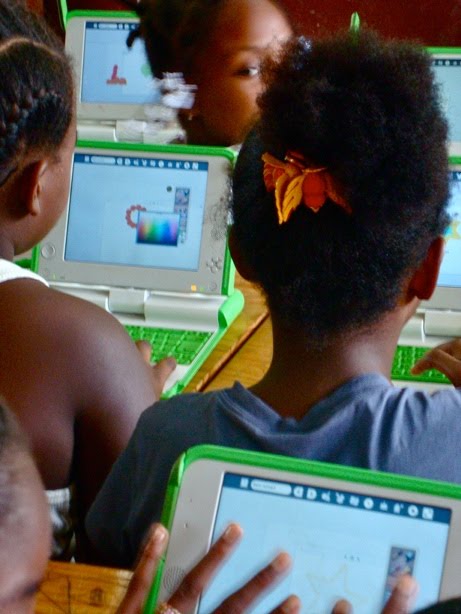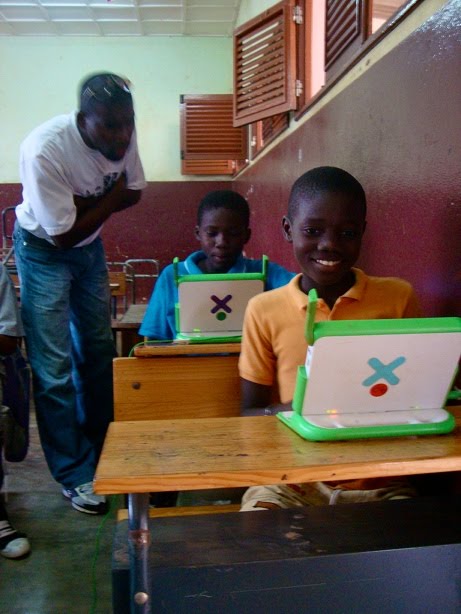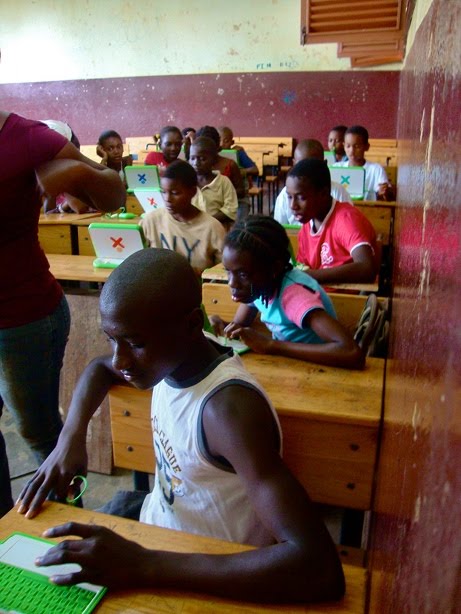From the São João secondary school on the island of São Tomé and Príncipe, Beth Santos writes the following in her post So Much to Say, So Little Energy:
There are students that are stealing computers now. If they are stealing them permanently or if they are just taking them home for the night without permission, I do not know. But I do know that some students are bringing backpacks to school and secretly slipping the computers into the backpacks.
It's a little heartbreaking. On one hand, I thought the students understood that these computers are on loan to them for the school year only, as we need to accommodate future students, not to mention the fact that these students will be moving to a different school system next year with teachers who are untrained in the XO laptop. On the other hand, ugh, it's so frustrating that these kids are stealing the computers because they like them so much. It's so frustrating that these kids are spending three hours of their vacation, every weekday, to sit inside and work on their computers BECAUSE THEY WANT TO!
I had to think of a solution, and it had to work.
When I came to class today, the energy was not working. We were hopeful that it would return, though, so we waited. As we waited, I met with the teachers. FINALLY my missing bag came through on the flight from Portugal today, so I got the teaching materials (and clothes and toiletries) that I was so badly hoping for. I passed those out (the teaching materials; not the toiletries).
I also passed out a handout that I created for the teachers last night, which included notes about teaching these computers. I explained to the teachers that teaching these computers is like teaching an art class- there is an instruction part, but there is also a very important creativity/experimentation part. The teachers here are used to working in a rote structure, which works for them, especially when they've got a large group of students to take care of. But we're trying to stay away from the rote with these laptops.
I explained to the teachers the importance not ordering the students to make a specific object or enter a specific number, but to encourage them to think for themselves, to try new things out, to have fun. I also encouraged them to let students help each other- to not stop class in order to solve one student's problem. In class, things worked better. They weren't perfect, and certainly not as efficient as I was hoping, but they were better. It will be a process, I know. But the good thing is, I feel like we're moving a foundation. It's not a temporary change we're making, it's forever.
Finally, I talked to the teachers about my solution to the stealing problem. And my solution was this:
First we gathered all of the students into one room. I have mastered the clapping exercise to make students quiet. I did this last year-- you clap in a rhythm and then the students repeat you, and you change the rhythm a few times and have them repeat you a few times, and then finally you stop and everyone is quiet since they're waiting for the next cue. This is how I manage a classroom of 100 students (though today there are much fewer...but since it's vacation time, we're not too too worried about attendance). Then I tell the students I have something important I want to talk to them about, and I just need five minutes of their time.
They were attentive.
I explained that the computers belong to the school, and that the idea is to use them for years to come. The computers that students are using right now are going to sixth graders next year, and the year after that, and years after that. They are participating in a really important program but in order to keep this program going, we need to take care of our computers. During vacation, we can't take the computers home because they're going to go to next year's students (the real reason is because the students are no longer enrolled at São João so there would be no way to track them if something happened). I told the students that there was something that was happening that was making us teachers very sad, and can anyone guess what it is?
No one could, so I continued. The thing that is making us teachers sad is the fact that there are some students, who we will not name, who have been taking the computers home without our permission. Because the computers belong to the school, taking the computers without teacher permission is called stealing. Some of the kids' eyes widened when I said that word, "stealing". I know they don't mean to steal. I told the students that the thefts are in the past now, but we need to work together to find the computers so we can keep using them. So if any student knows of any other student that has one of these computers, please encourage them to bring that computer back to the school and no one will be punished.
As to the fun part.
Starting this summer, and in years to come, we will be offering a contest for students participating in the computer program. Since we're just thinking of this contest now, this summer it will be a story-writing contest for who writes the best Etoys storybook (stories need to be 5-10 pages with text and drawings on each page, they need to be written in good Portuguese and need to have at least three animations on them). On the last day of class, we will all leave our laptops on the tables and walk around the classroom and look at the stories. Then students will silently vote on their five favorite stories on a piece of paper. The writers of the five best stories will be awarded with an XO laptop, that they will be able to keep--forever.
The kids went nuts when they heard this. FOREVER?! That's a long time.
In years to come, we can keep the five laptop giveaway going. I can see how it could be controversial- awarding this select group of students laptops to keep forever could perhaps seem like some weird gameshow charity. But I think it's quite in line with the original OLPC ideals of individual ownership. It's also a pretty big deal for the students, and an enormous motivator to do well in the classroom and to attend class in order to work on their projects.
And finally, it's a solution to stealing. Psychologically, if students understand that the computers need to be taken care of because they are simply on loan to them, BUT they also understand that they have the opportunity to legitimately own a computer themselves if they try hard enough, then I strongly believe that it will bring an end to the theft. Students are not trying to hurt anyone by stealing- they just want an opportunity. Now this is their chance to get it.
And if they're not one of the five winners, they need not despair- there are computers available for use at the national high school, and there are also going to be 20 computers available at São João for public use-- all people need to do is ask a teacher and, particularly if they are a previous student, they will be welcome to use the computer anytime during the school day.





I think that the contest -- and ensuring access later in life and for the public -- is actually a good idea. Best of luck with it!
btw, have any of the missing laptops reappeared?
How about using the Pol activity for recording the votes for the stories?
It's really great to use Poll in the training as well. At the end of each training session, we ask the teachers to fill in a Poll questionnaire on the effectiveness of the session.
It strengthens the use of another activity, but it also encourages the use of measurement and evaluation. Then the teachers can use it in the class room.
Ian
Why not just get a decent locker?